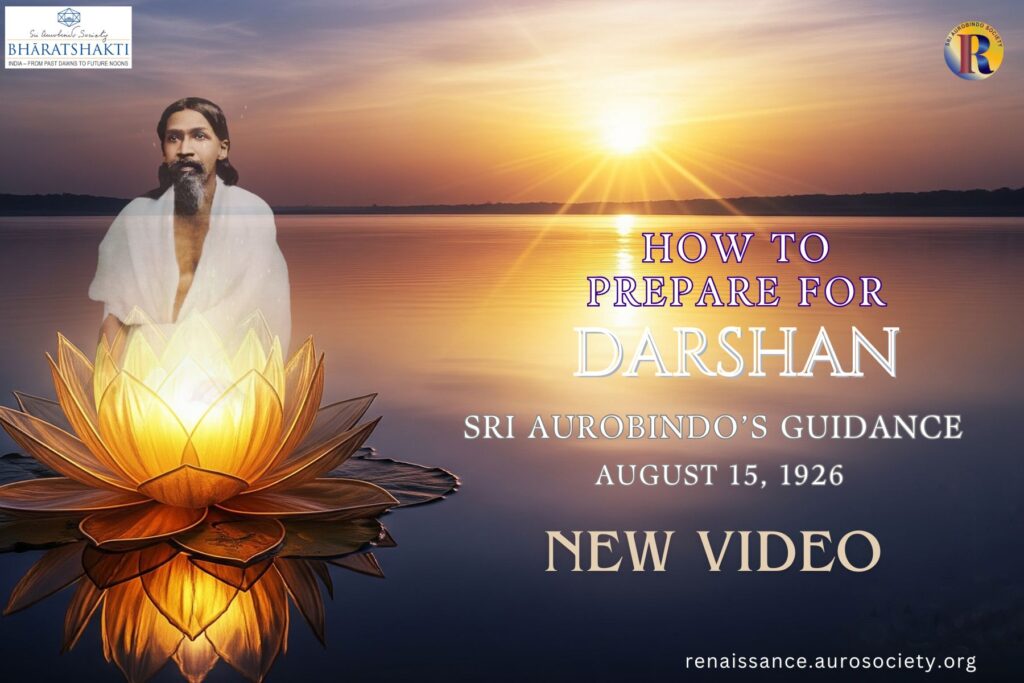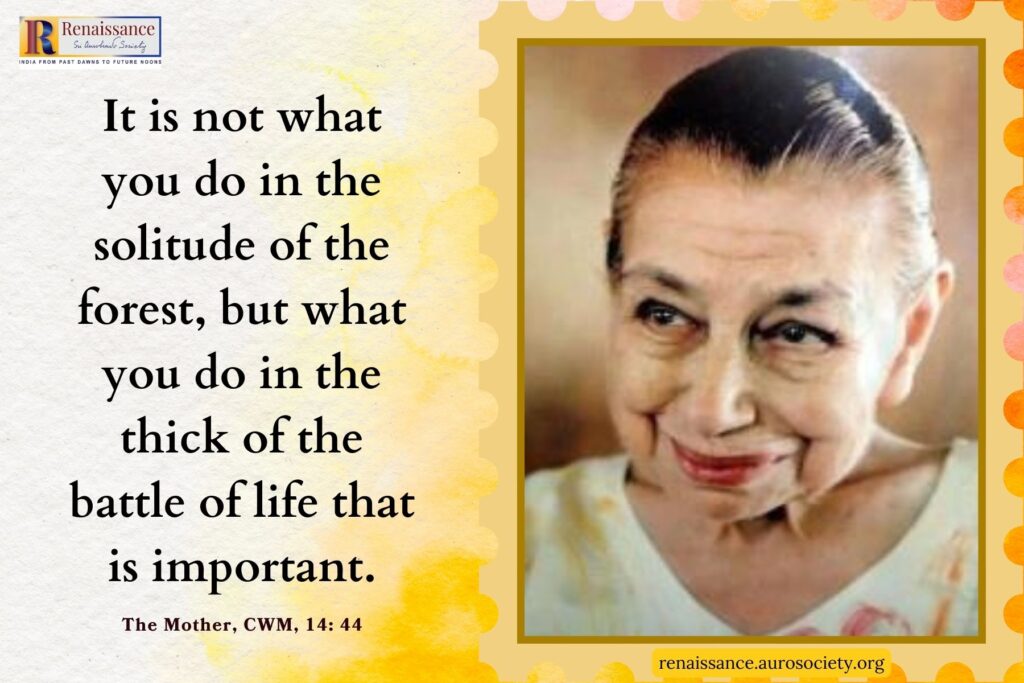Volume II, Issue 7
Author: Sri Aurobindo and the Mother
Editor’s note: For our Sunlit Path feature, we highlight a few gems from Sri Aurobindo and the Mother which offer some practical guidance for the aspirant on the path of Integral Yoga.
Particularly significant points include: the necessity of personal effort to keep the fire of aspiration burning while simultaneously relying on the Divine Grace; aspiring intensely but not impatiently; becoming conscious of one’s inner flame; not mixing any demand with one’s aspiration; and sincerity and single-mindedness of the aspirant.

Rely on the Divine and Yet Do Some Enabling Sadhana
A simple, straight and sincere call and aspiration from the heart is the one important thing and more essential and effective than capacities. Also to get the consciousness to turn inwards, not remain outward-going is of great importance—to arrive at the inner call, the inner experience, the inner Presence.
(Sri Aurobindo, CWSA, Vol. 29, p. 55)
* * *
One must rely on the Divine and yet do some enabling sadhana— the Divine gives the fruits, not by the measure of the sadhana but by the measure of the soul and its aspiration. Also worrying does no good— “I shall be this, I shall be that, what shall I be?” Say “I am ready to be not what I want, but what the Divine wants me to be”—all the rest should go on that base.
(Sri Aurobindo, CWSA, Vol. 29, p. 55)
* * *
It is your mistake to think that everything must come of itself and nothing is within your own power to do. This kind of belief in the necessity of passivity to all movements should be thrown aside. Will, aspiration, surrender are things that you must do yourself—although even in doing them you must call in the Divine Power to help your will, aspiration and surrender and make them effective.
(Sri Aurobindo, CWSA, Vol. 29, p. 59)

Read:
Aspiration and Psychic Being
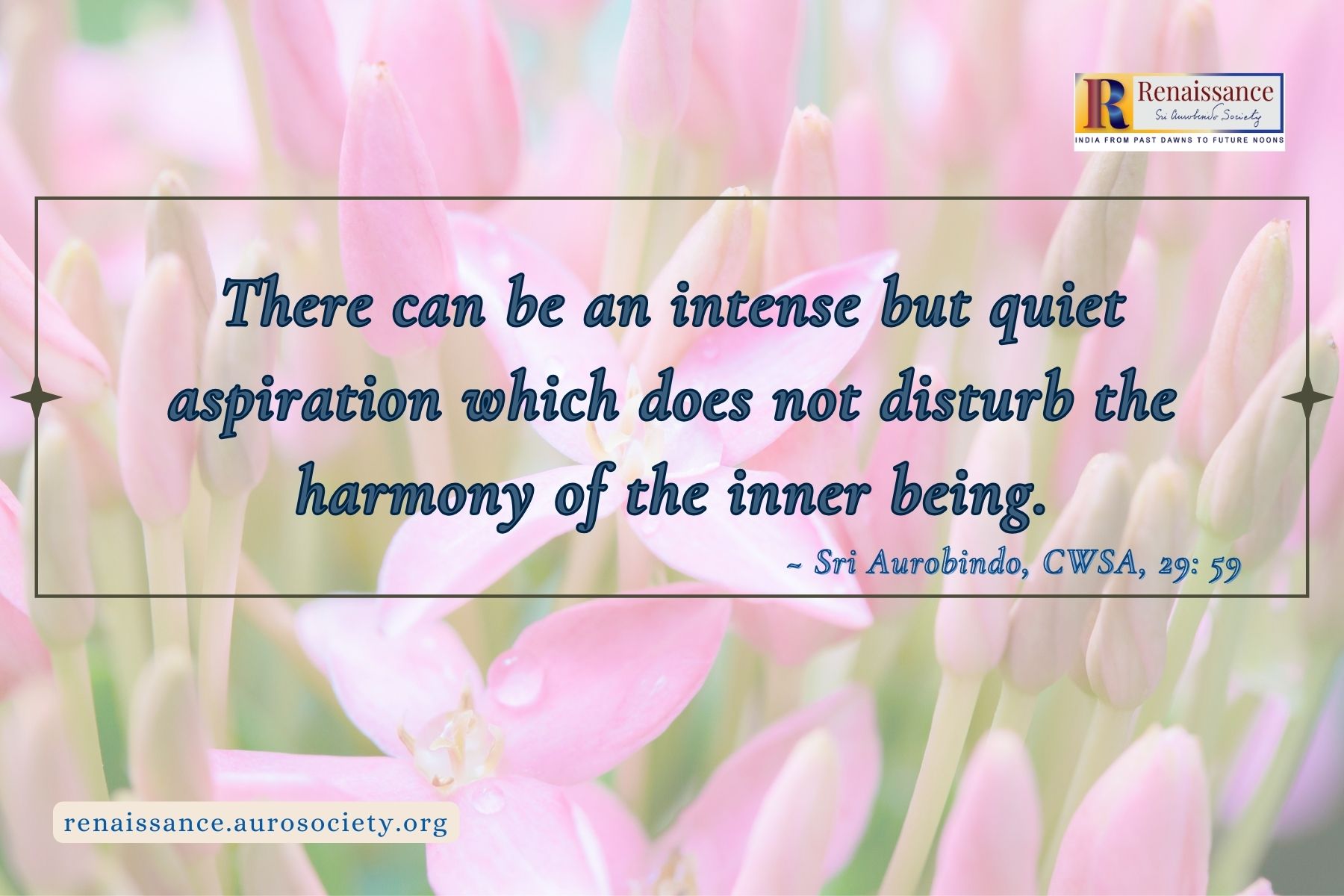
Aspiration Must Rise Straight Upwards
Aspiration is like an arrow, like this (gesture). So you aspire, want very earnestly to understand, know, enter into the truth. Yes? And then with that aspiration you do this (gesture). Your aspiration rises, rises, rises, rises straight up, very strong and then it strikes against a kind of… how to put it?… lid which is there, hard like iron and extremely thick, and it does not pass through. And then you say, “See, what’s the use of aspiring? It brings nothing at all. I meet with something hard and cannot pass!”
But you know about the drop of water which falls on the rock, it ends up by making a chasm: it cuts the rock from top to bottom. Your aspiration is a drop of water which, instead of falling, rises. So, by dint of rising, it beats, beats, beats, and one day it makes a hole, by dint of rising; and when it makes the hole suddenly it springs out from this lid and enters an immensity of light, and you say, “Ah, now I understand.”
It’s like that.
So one must be very persistent, very stubborn and have an aspiration which rises straight upwards, that is, which does not go roaming around here and there, seeking all kinds of things.
(The Mother, CWM, Vol. 7, p. 235)
* * *
Sri Aurobindo also has written this: Aspire intensely, but without impatience. . . The difference between intensity and impatience is very subtle—it is all a difference in vibration. It is subtle, but it makes all the difference.
(The Mother, CWM, Vol. 10, p. 200)
* * *
It is a mistake to think that a constant absence of vyākulatā is a sign that the aspiration or will for the Divine is not true. It is only in certain exclusive forms of Bhakti Yoga that a constant vyākulatā or weeping or hāhākāra (the latter is more often vital than psychic) is the rule.
Here though the psychic yearning may come sometimes or often in intense waves, what comes as the basis is a quietude of the being and in that quietude a more and more steady perception of the truth and seeking for the Divine and need of the Divine so that all is turned towards that more and more. It is into this that the experience and growing realisation come.
(Sri Aurobindo, CWSA, Vol. 29, p. 359)

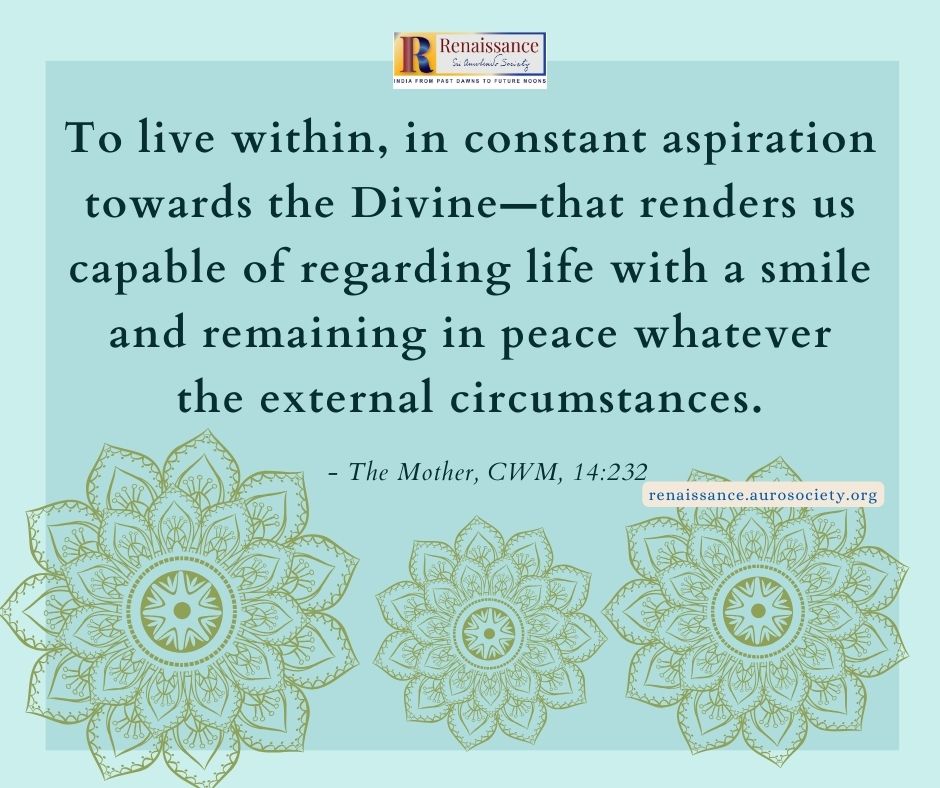
Dryness and Difficulty of Spontaneous Aspiration
Naturally the more one-pointed the aspiration the swifter the progress. The difficulty comes when either the vital with its desires or the physical with its past habitual movements comes in—as they do with almost everyone. It is then that the dryness and difficulty of spontaneous aspiration come.
This dryness is a well-known obstacle in all sadhana. But one has to persist and not be discouraged. If one keeps the will fixed even in these barren periods, they pass and after their passage a greater force of aspiration and experience becomes possible.
You are finding it still difficult to bear the interval periods when all is quiet and nothing being done on the surface. But such interval periods come to all and cannot be avoided.
You must not cherish the suggestion that it is because of your want of aspiration or any other unfitness that it is so and, if you had the constant ardent aspiration, then there would be no such periods and there would be an uninterrupted stream of experiences. It is not so.
Even if the aspiration were there, the interval periods would come. If even in them one can aspire, so much the better—but the main thing is to meet them with quietude and not become restless, depressed or despondent.
A constant fire can be there only when a certain stage has been reached, that is when one is always inside consciously living in the psychic being, but for that all this preparation of the mind, vital, physical is necessary.
For this fire belongs to the psychic and one cannot command it always merely by the mind’s effort. The psychic has to be fully liberated and that is what the Force is working to make fully possible.
(Sri Aurobindo, CWSA, Vol. 29, pp. 61-62)

Don’t miss:
A Vedic Hymn to Agni, in Hindi Poetry
Be Conscious of Your Inner Flame
Q: When the consciousness feels imprisoned within its too narrow external mould, what should be done?
You must particularly not be violent, for if you are violent, you will come out of it tired, exhausted, without any result.
You must concentrate all the forces of aspiration. If you are conscious of the inner flame, you should put into this flame all that you find strongest in you by way of aspiration, of a call, and hold yourself as quiet as you can, calling, with a deep reliance that the answer will come; and when you are in this state, with your aspiration and concentrated force, with your inner flame, press gently upon this kind of outer crust, without violence, but with insistence, as long as you can, without getting agitated, irritated or excited. You must be perfectly quiet, must call and push.
It will not succeed the first time. You must begin again as many times as is necessary, but suddenly, one day. . . you are on the other side! Then you emerge in an ocean of light.
If you fight, if you are restless, if you struggle, you will get nothing at all; and if you become irritable you will only get a headache, that is all.
Yes, it is that. To gather together all your power of aspiration, make of it something intensely concentrated, in an absolute tranquillity, to be conscious of your inner flame and throw into it all you can that it may burn ever higher and higher, and then call with your consciousness and, slowly, push. You are sure to succeed one day.
(The Mother, CWM, Vol. 4, p. 100)

Do Not Bargain with the Divine
Mother reads a comment made by someone during her talk in 1929:
“In the case of some persons who turn to the Divine it happens that every material prop or everything they are fond of is removed from their life. And if they love someone he also is taken away.” (Questions and Answers 1929, 14 April)
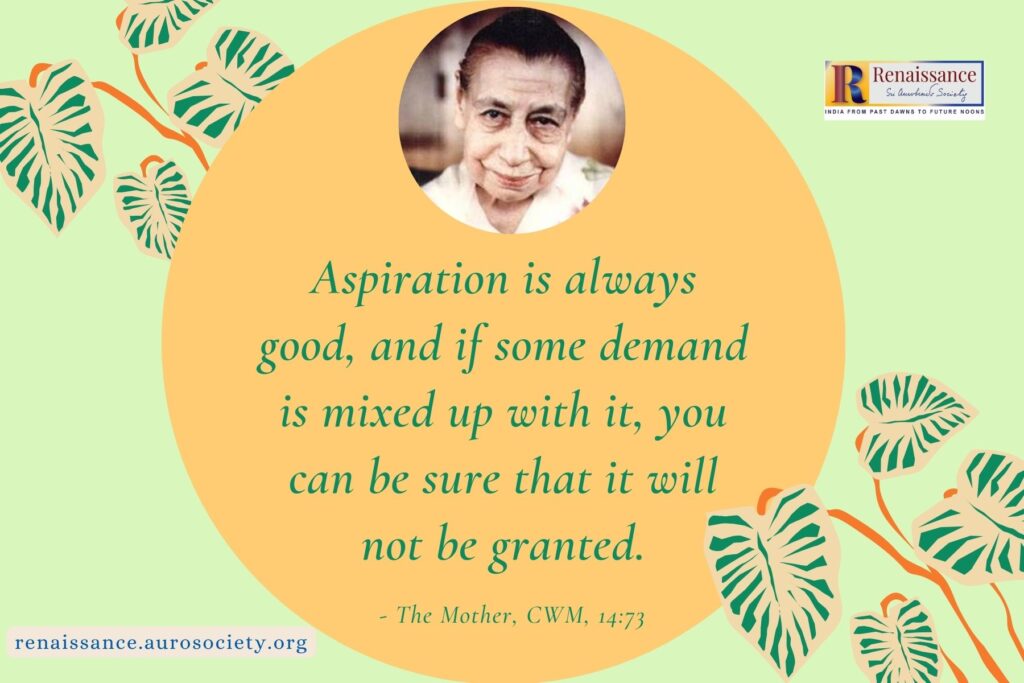
We enter here into a big problem. . . The notion of what is good for a being and what isn’t is not the same to his evolved consciousness as to the divine consciousness.
What appears to you good, favourable, is not always what’s best for you from a spiritual point of view. It is this which must be learnt from the beginning, that the divine perception of what will lead you fastest to the goal is absolutely different from yours, and that you cannot understand it. That is why you must say to yourself from the beginning, “It is all right. I shall accept everything and I shall understand later on.”
So often you come across persons who, before they began yoga, had a relatively easy life, and as soon as they come to yoga, all the circumstances to which they were particularly attached break away from them more or less brutally. Then they are troubled; they do not perhaps have the frankness to admit it to themselves, they perhaps take recourse to other thoughts and other words, but it comes to this: “How is it? I am good and I am not treated kindly!”
The entire human notion of justice is there. “You try to become good and what cataclysms befall you! All the things you loved are taken away from you, all the pleasures you have had are taken away from you, all the people whom you loved leave you; it is indeed not worth the trouble to be good and to have made an effort.”
And if you follow your reasoning far enough, all of a sudden you come upon the canker—so, you wanted to do yoga out of self-interest, you wanted to be good out of self-interest, you thought your situation would be better and you would be given a bonbon for your wisdom! And that does not happen! . . .
Well, this refusal is the best lesson that could ever be given to you. For as long as your aspiration hides a desire and as long as in your heart there is the spirit of bargaining with the Divine, things will come and give you blows till you wake up to the true consciousness within you which makes no conditions, no bargains. That’s all.
Q: Since the time I have been doing yoga I find that all my affairs are going better than before. So I conclude. . .
Perhaps your aspiration was truly sincere and disinterested. In such a case, things must happen like that.
(The Mother, CWM, Vol. 4, pp. 100-102)

Keep Fixed on the One Thing Indispensable
But why allow anything to come in the way between you and the Divine, any idea, any incident; when you are in full aspiration and joy, let nothing count, nothing be of any importance except the Divine and your aspiration. If one wants the Divine quickly, absolutely, entirely, that must be the spirit of approach, absolute, all-engrossing, making that the one point with which nothing else must interfere.
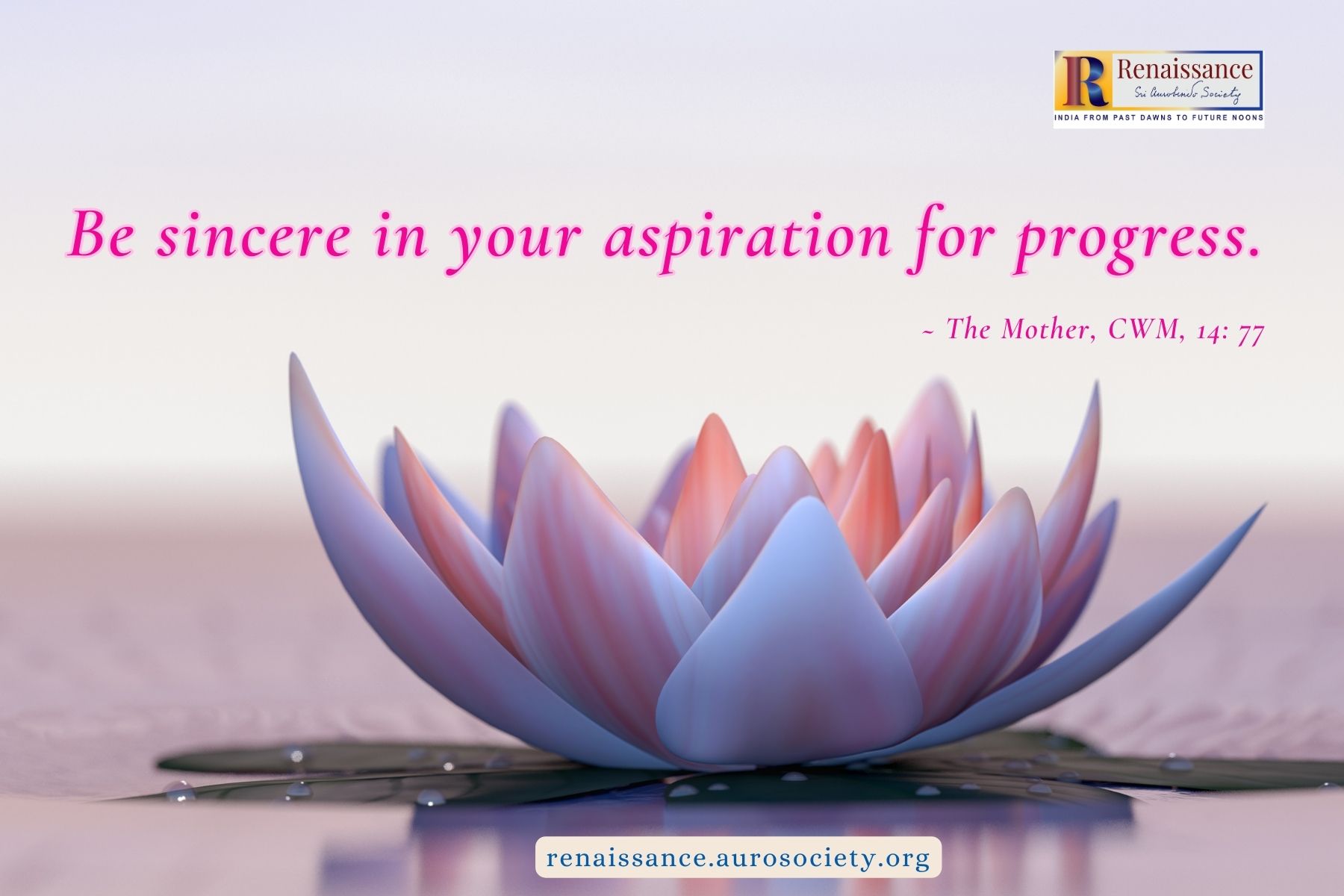
What value have mental ideas about the Divine, ideas about what he should be, how he should act, how he should not act—they can only come in the way. Only the Divine Himself matters. When your consciousness embraces the Divine, then you can know what the Divine is, not before. Krishna is Krishna, one does not care what he did or did not do; only to see Him, meet Him, feel the Light, the Presence, the Love, the Ananda is what matters. So it is always for the spiritual aspiration—it is the law of the spiritual life.
Don’t waste time any longer in these ideas of the mind or in any starts of the vital— blow these clouds away. Keep fixed on the one thing indispensable.
(Sri Aurobindo, CWSA, Vol. 29, p. 56)

Also See:
Agni, the Divine Will-Force, the Priest of the Sacrifice
~ Design: Biswajita Mohapatra and Beloo Mehra

